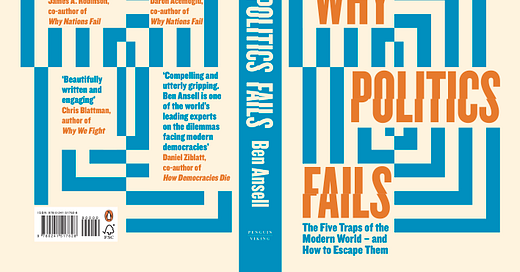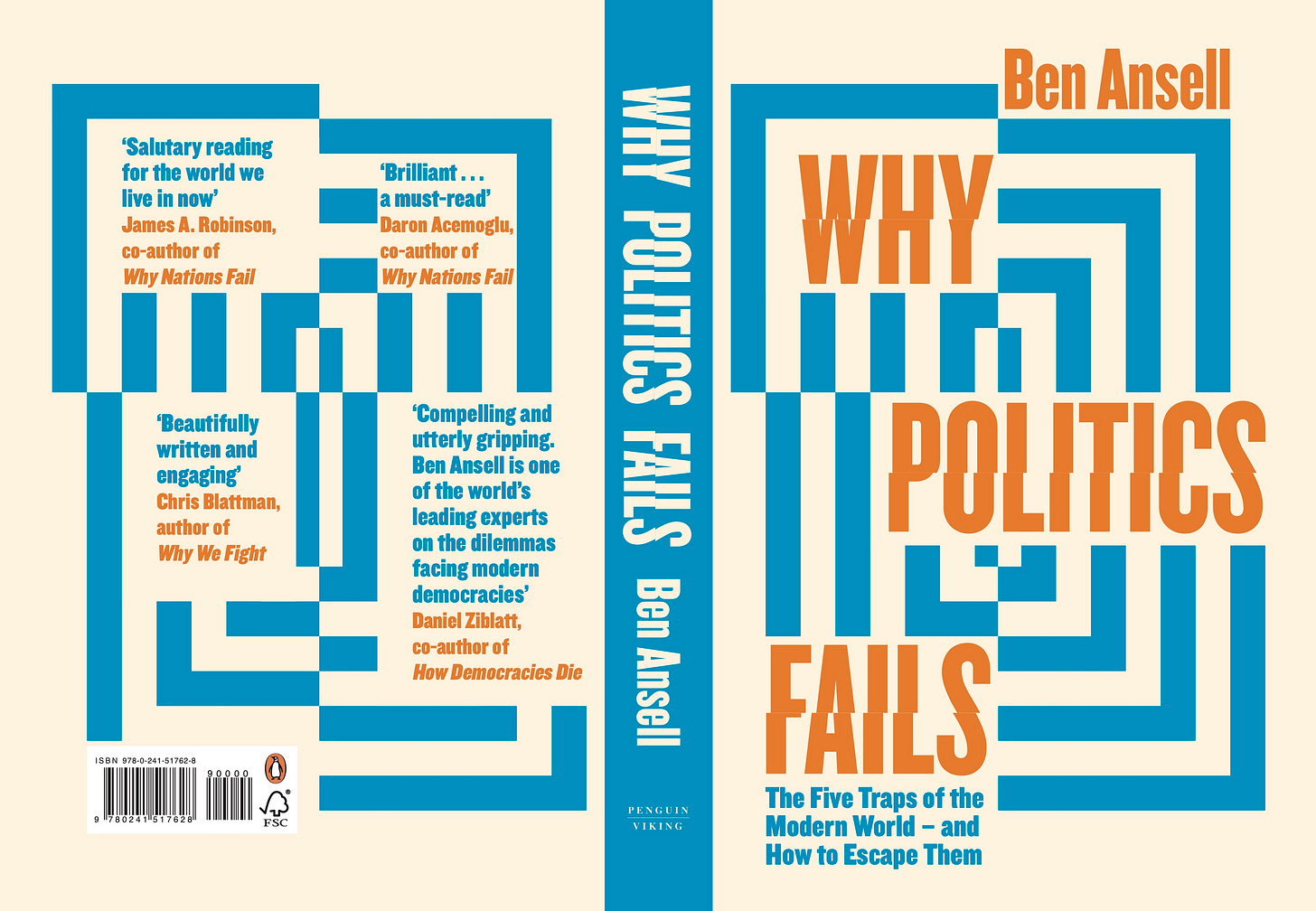Why Politics Fails: Out in the UK Today
Why it's so hard to get the world we want and what we can do about it
Today is the day that Why Politics Fails is finally released in the UK in hardback, kindle, and audiobook. In what follows, I talk a little about why I wrote the book and what I hope you’ll get from reading it. But first, some links for the curious among you who would like to buy it! You can order from my publisher Viking/Penguin here, from Amazon here, from Waterstones here, and from Blackwells here. But please do ask your friendly neighbourhood independent bookstore to order in copies so you can support local businesses.
Why is so hard to get the world we want? Despite our current political tumult, there are things that we do broadly agree on - we want to govern ourselves not dance to the tunes of dictators; we want to be treated equally and avoid a dystopian society of a tiny elite and impoverished masses; we want to be looked after when we’re ill or destitute; we want to be safe in our houses and on our streets; and we want to have enough to live on and ideally more from generation to generation.
In other words, we want democracy, equality, solidarity, security, and prosperity. But it’s no simple task to achieve these collective goals. And our politics often seems to get in the way. So how we can stop our politics from failing and get closer to a society we’re proud to leave to generations yet to come? How can we make politics succeed?
These are big questions, I’ll grant you. But it’s a big book! Drawing on almost two decades of my own research and cutting edge scholarship across the social sciences, I explain why politics fails so often. Throughout the book, I continually trace how our individual self-interest sabotages our collective goals.
Unfortunately, we can’t wish away our self-interest anymore than we can wish away our personalities. Politics is difficult not (only) because of politicians. It’s hard because of us! We disagree. We misrepresent what we want. We look for easy options. We renege on deals. We cheat. We’re humans.
And that means we end up in a series of traps: a democracy trap, an equality trap, and so forth. When our self-interest tempts us away from collective goals we, perhaps inadvertently, set off these traps. And because there is no-one who can enforce political decisions - no judge, jury and executioner who can make parties follow their promises, or indeed make countries follow treaties - we will fall into these traps again and again.
That sounds rather tragic. And the temptation for academics like myself is often to leave the story there, waving our hands helplessly, and say, gosh isn’t collective action difficult? But I don’t want you to think the book is a desperate jeremiad. I also explain what we can do to escape these traps.
We will need to harness and constrain politics to help it serve our ends. A number of popular and… well… populist books have recently come out, arguing that the mass public is disregarded and disrespected by some shadowy (possibly woke) elite. I don’t think that’s a helpful way of looking at the world. The mass public doesn’t all agree with one another, and nor do the alleged elite. Trying to solve our problems by divining the true 'will of the people’ is destined to fail because there isn’t one. We are trying to squeeze disagreement out of politics. And that’s not possible. If you push down politics in one place, it just pops up in another.
And so, I argue in the book that we need to take our institutions more seriously. They are not always fit for purpose. But they guide our expectations about what other people will do and to channel our disagreements more constructively. They embed the political promises we made to each other in the past and which will continue to serve us today.
Yes Parliament can be fusty, rule-bound, and indecisive. But proroguing it just turned indecision into polarisation. Yes the US Senate’s filibuster rule unfairly privileges small rural states and slows down progressive reforms. But removing it allowed Donald Trump to quickly appoint three Supreme Court justices without effective opposition, who then overturned Roe vs Wade. Of course no-one wants institutions to completely defang the democratic public but nor is democracy unchained and unmoored always stable. In other words our institutions are a key part of liberal democracy.
The book also argues that social norms - of trust, of solidarity, of shared-fate, and of respect for those very institutions - are crucial to making politics work. Want a wealth tax? Then you need to understand people’s norms about passing hard-earned savings on to their beloved? Want to control road rage? Then you need people to reward good-driving and shame tailgaters. Want to lock down your countries when a new pandemic emerges? Then you need to foster trust in your government and police.
And so, the book has a double-edged title. Politics fails all the time because we all disagree and we all misbehave. But it fails more fundamentally if we pretend we can get along without it. That better living through technology will magic our differences away. As even Elon has found, artificial intelligence can’t make people behave on Twitter. And as one-time Sam Bankman-Fried enthusiasts have discovered, crypto-currencies and exchanges operating out of the purview of government don’t necessarily respect the property rights of consumers in a brave new techno-libertarian world.
Because we can’t - and shouldn’t - try and push politics out of our lives, the book is also a plea against the siren-song of populism. Populist leaders can’t force consensus on us when we fundamentally disagree. And when they find the will of the people harder to locate than they thought, they will end up silencing uncomfortable voices. One thing that the tradition of liberalism does get right, I think, is to acknowledge that politics is about managing disagreement not prophesying a true collective will.
So, that’s the overall argument. To make it I cover a massive array of historical and contemporary cases from across the world. Below is a quick taster of the ground the book covers in each of its traps.
The Democracy Trap: ‘There’s no such thing as the will of the people’
The democracy trap covers everything from battles over Brexit, to ancient Athenian democracy, to fights over the US debt ceiling; the doomed Polish-Lithuanian commonwealth to e-voting in Taiwan; citizens assemblies on abortion in Ireland to app-based voting.
The Equality Trap: ‘Equal rights and equal outcomes undermine each other’
The equality trap looks at fights over the US wealth tax and Jeff Bezo's voyage to space; just how unequal the Roman Empire could have been; wealthy Italian notaries and imprisoned Russian oligarchs; paternity leave in Norway, apprenticeships in Germany, and robot taxes in South Korea.
The Solidarity Trap: ‘We only care about solidarity when we need it ourselves’
The solidarity trap looks at fights over Obamacare and the merits of the Universal Basic Income; school choice and misperceptions of welfare fraud; creating social solidarity between Hindus and Muslims in India; and even, just maybe, among Americans.
The Security Trap: ‘We can’t avoid anarchy without risking tyranny’
The security trap ranges from how to catch a pig thief in medieval England to body worn cameras on American cops; from the overbearing social credit system in China to the anarchy of contemporary Somalia; from nosy conformist Danish villages to mimes directing traffic on the streets of Bogota
The Prosperity Trap: ‘What makes us richer in the short run makes us poorer over the long haul’
The prosperity trap examines Bitcoin in El Salvador and impoverished British aristocrats in the South Sea bubble; why Norway spends oil revenues on social welfare but the UAE spends it on the Louvre; and whether the Paris Climate Accords, weak as they were, might be just what we need to stop the planet warming beyond repair.
As you can see, the book is very wide-ranging in topics and international in focus. But I also think it helps us understand our contemporary debates in British politics and beyond. And certainly, that’s what my last few Substack posts have tried to do. I hope the book is both timeless and immediate. That’s a lot to hope for but you can be the judge!
Ultimately the reason I wrote the book is because I want a wider readership to get as excited about politics and political economy as I have been over my career. The lessons I draw from social science will, I believe, help you better understand some of the challenges we face and how we might be able to overcome them. And at a minimum, you’ll learn about the costumed mimes of Bogota.
And should you not trust my word - here’s what a series of brilliant minds have said about the book.
Daniel Ziblatt (How Democracies Die): "Compelling and utterly gripping"
Daron Acemoglu (Why Nations Fail): "Brilliant... a must-read"
Chris Blattman (Why We Fight): "Beautifully written and engaging"
Jim Robinson (Why Nations Fail): "Salutary reading for the world we live in now"
Nick Pearce (review in FT): "A meticulous study of how different societies find it so difficult to achieve widely shared goals"
Publishers Weekly (review): “Ansell’s deep thinking is balanced by his crisp prose and accessible examples... It’s a stellar exposition of a subject that often feels too big to grasp”
I’m delighted to have been able to write this book for a broader public and I hope this introduction to it has whetted your appetite.
Here are some links - strike now! Or if you’re North American, try and hold your excitement until May 23rd…
Amazon (UK)






It's surprising, or maybe not surprising given political trends in the last few years, that 'liberty' is not something you deem us all to agree on, but 'solidarity'- a word with strong socialist connotations - is. I suppose in a way this strengthens your point about people disagreeing. Looking forward to reading the book anyway.
Bought this book a year ago and found myself using it for my Critical Evaluation Paper regarding Education for Sustainable Development (as an aspiring primary school teacher ^_^). This book got me THINKING for sure about how our world works and how we can be one decision away from conflicts or even a better life. As someone who considered themselves "not very into politics"... well, I guess I am now "into politics", and we all SHOULD be!